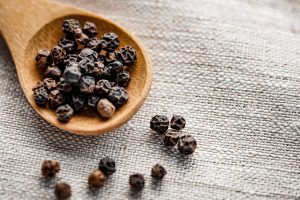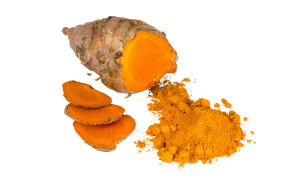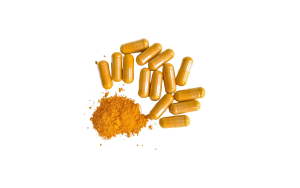HEALTH TOPICS
Turmeric and Curcumin, What's the Difference?
Posted by: Jacob Byrne BHSc Adv.Dip Nut Med
Tumeric or Curcuma longa, has been used for its countless health benefits in reducing systemic inflammatory processes within the body. The current research on turmeric has highlighted the effect of one key polyphenol component of turmeric specifically: Curcumin.
Tumeric has been used for centuries by many different human civilisations not only as an aromatic and colourful spice but as a traditional medicine to treat and support conditions such as inflammation, and GIT disturbances, to protect the brain and as a digestive tonic. To date, research has found promising results in the effects of turmeric in serval chronic health conditions affecting the GIT, brain, cardiovascular system, skin and conditions mediated by oxidative stress and inflammation.
Curcumin (Curcuminoids)
Curcumin is the active component with the turmeric rhizome, which is directly shown to help down-regulate oxidative, and inflammatory processes in the body by increasing serum activities of Superoxide dismutase (SOD), serum levels of glutathione and lipid peroxidases (these are the body’s endogenous anti-oxidant compounds). Curcumin is an excellent free radical scavenger and similar to vitamin E has the ability to be an effective free radical scavenger of peroxyl radicals, meaning it is considered a chain-breaking antioxidant.
Curcumin is naturally found in small amounts within the turmeric rhizome, generally, about 3% of the total constituents of turmeric is curcumin. Curcumin is known as the key component of turmeric that aids in reducing pain and improving quality of life due to its antioxidant and anti-inflammatory effects. Other effects attributed to this effect are known as curcuminoids which other than curcumin include: demethoxycurcumin, and bisdemethoxycurcumin.
By itself alone, curcumin has poor bioavailability when consumed orally, this is due to the compound being poorly absorbed, rapidly metabolised and eliminated from the body. To counter these effects, research has found a novel compound from black pepper to increase the absorption rate of curcumin by more than 10x fold.
 Piperine
Piperine
Piperine is the major active component of black pepper and when taken in combination with curcumin, this boosts the absorption of the polyphenol by more than 2000% some studies have shown. Because of Curcumin’s poor absorption rate, it is important to take curcumin preparations with a form of piperine to increase both absorption, duration and efficacy of the anti-inflammatory and antioxidant properties of Curcumin.
To standardise or not to standardise?
This has been a debate in some circles with the belief being whole plant medicines are the best plant medicines and that no single compound has a greater effect than the sum of the whole. While true in essence, amazing research has been conducted showing the benefits of standardising single extracts of curcuminoids in combination with piperine that exhibit remarkable effects on pain management and inflammatory conditions as well as cardiovascular health and prevention.
Choosing the right supplement for you
If your looking for the perfect turmeric supplement to help prevent or lessen pain and joint ailments, then a standardised formulation is your best option! When taking a standardised product you know you are getting the same amount of active curcumin per capsule or tablet in every bottle. This is compared to taking a non-standardised formula which may contain differing amounts of active turmeric compounds per tablet and this can also vary from batch to batch. Ensuring your supplement also contains piperine from black pepper is the best way to ensure you’re getting optimal absorption of these beneficial anti-inflammatory and antioxidant compounds.
What turmeric supplements would I recommend and why?
In the industry currently, standardisation is becoming the normal procedure for most researched bio-active plant compounds. If your looking for the best turmeric supplement for yourself or a loved one here is what to look out for:
- Standardised Curcumin or Curcuminoids – Ensuring your product ingredient list states ‘Standardised to curcumin or curcuminoids’.
- Includes Black Pepper or Piperine – This ensures optimal absorption of the active compounds found in turmeric to give you the best benefits from your supplement.
- Other ‘adjuvants’ to support the effects of your curcumin – These are herbs that support the effects of the curcumin to improve or enhance the benefits of your supplement. These herbs include ginger, Boswellia (also known as frankincense) and cayenne pepper which are both circulatory stimulants and provide other anti-inflammatory actions to work synergistically with the effects of the curcumin in your formulation.
- Take with a meal containing ‘fats’ – Curcumin is a fat-soluble compound and is better absorbed into the body when ingested with other fats from dietary sources. This can be as simple as animal or vegetable fats from your meal, and some MCT oil in your turmeric latte in the morning.
Recommendations:
Whichever formulation you choose taking your turmeric with a main meal containing fat will increase your absorption. Due to the short activity within the body, it is recommended to take curcumin up to 3 x daily with a meal, depending on your needs and requirements. Dosages will be different depending on if the presenting condition is long-term and chronic or from an acute injury.
- Nature’s Help Curcumin Plus – This formulation contains 600mg of curcumin (the active compound in turmeric) and 100mg of piperine derived from 1g of black pepper.
- Fusion Curcumin Advanced – This formulation contains 190mg of standardised mixed curcuminoids, 150mg of standardised Boswellia, 75mg of ginger and 85mg of black pepper.
- Fusion Turmeric High Potency – This formulation contains 368.2mg of curcuminoids and 3.56mg of standardised piperine from black pepper.
- Herbs of Gold Bio Curcumin 5400 – This formulation contains 200mg of standardised Meriva® curcumin, this is a patented extract of curcumin with enhanced absorption that has been clinically trialled and does not require piperine as an adjuvant for absorption within the human GIT tract. This is due to its combination with fatty molecules known as phospholipids that enhance curcumin absorption.
References
Belcaro, G., Cesarone, M. R., Dugall, M., Pellegrini, L., Ledda, A., Grossi, M. G., Togni, S., & Appendino, G. (2010a). Product-evaluation registry of Meriva®, a curcumin-phosphatidylcholine complex, for the complementary management of osteoarthritis. Panminerva Medica, 52(2 Suppl 1), 55–62.
Belcaro, G., Cesarone, M. R., Dugall, M., Pellegrini, L., Ledda, A., Grossi, M. G., Togni, S., & Appendino, G. (2010b). Efficacy and safety of Meriva®, a curcumin-phosphatidylcholine complex, during extended administration in osteoarthritis patients. Alternative Medicine Review: A Journal of Clinical Therapeutic, 15(4), 337–344.
Daily, J. W., Yang, M., & Park, S. (2016). Efficacy of Turmeric Extracts and Curcumin for Alleviating the Symptoms of Joint Arthritis: A Systematic Review and Meta-Analysis of Randomized Clinical Trials. Journal of Medicinal Food, 19(8), 717–729. https://doi.org/10.1089/jmf.2016.3705
Fança-Berthon, P., Tenon, M., Bouter-Banon, S. L., Manfré, A., Maudet, C., Dion, A., Chevallier, H., Laval, J., & van Breemen, R. B. (2021). Pharmacokinetics of a Single Dose of Turmeric Curcuminoids Depends on Formulation: Results of a Human Crossover Study. The Journal of Nutrition, 151(7), 1802–1816. https://doi.org/10.1093/jn/nxab087
Franceschi, F., Feregalli, B., Togni, S., Cornelli, U., Giacomelli, L., Eggenhoffner, R., & Belcaro, G. (2016). A novel phospholipid delivery system of curcumin (Meriva®) preserves muscular mass in healthy aging subjects. European Review for Medical and Pharmacological Sciences, 20(4), 762–766.
Prasad, S., & Aggarwal, B. B. (2011). Turmeric, the Golden Spice: From Traditional Medicine to Modern Medicine. In I. F. F. Benzie & S. Wachtel-Galor (Eds.), Herbal Medicine: Biomolecular and Clinical Aspects (2nd ed.). CRC Press/Taylor & Francis. http://www.ncbi.nlm.nih.gov/books/NBK92752/
Ramadan, G., & El-Menshawy, O. (2013). Protective effects of ginger-turmeric rhizomes mixture on joint inflammation, atherogenesis, kidney dysfunction and other complications in a rat model of human rheumatoid arthritis. International Journal of Rheumatic Diseases, 16(2), 219–229. https://doi.org/10.1111/1756-185X.12054
Thavorn, K., Mamdani, M. M., & Straus, S. E. (2014). Efficacy of turmeric in the treatment of digestive disorders: A systematic review and meta-analysis protocol. Systematic Reviews, 3, 71. https://doi.org/10.1186/2046-4053-3-71
White, C. M., Pasupuleti, V., Roman, Y. M., Li, Y., & Hernandez, A. V. (2019). Oral turmeric/curcumin effects on inflammatory markers in chronic inflammatory diseases: A systematic review and meta-analysis of randomized controlled trials. Pharmacological Research, 146, 104280. https://doi.org/10.1016/j.phrs.2019.104280
Subscribe to Gr8Health
Sign up to get 5% off your first order, exclusive access to our special offers, new arrivals and more.

